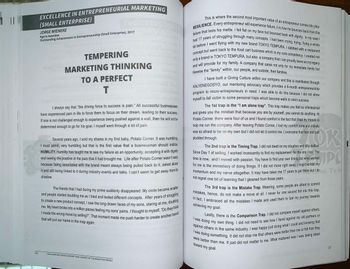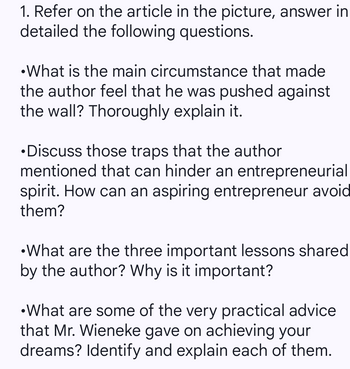
Practical Management Science
6th Edition
ISBN: 9781337406659
Author: WINSTON, Wayne L.
Publisher: Cengage,
expand_more
expand_more
format_list_bulleted
Question

Transcribed Image Text:EXCELLENCE IN ENTREPRENEURIAL MARKETING
(SMALL ENTERPRISE)
JORGE WIENEKE
Agora Awardee
Outstanding Achievement in Entrepreneurship (Small Enterprise), 2017
TEMPERING
MARKETING THINKING
TO A PERFECT
T
I always say that "the driving force to success is pain." All successful businessmen
have experienced pain in life to force them to focus on their dream, leading to their success.
If one is not challenged enough to experience being pushed against a wall, then he will not be
determined enough to go for his goal. I myself went through a lot of pain.
Several years ago, I sold my shares in my first baby, Potato Corner. It was humbling,
I must admit, very humbling but that is the first value that a businessman should imbibe,
HUMILITY. Humility has taught me to see my failure as an opportunity, accepting it with dignity
and seeing the positive in the pain that it had brought me. Life after Potato Corner wasn't easy
because being associated with the brand meant always being pulled back to it, asked about
it and still being linked to it during industry events and talks. I can't seem to get away from its
shadow.
The friends that I had during my prime suddenly disappeared. My circle became smaller
and people started doubting me as I tried and tested different concepts. After years of struggling
to create a new product concept, I saw the long-drawn faces of my sons, staring at me, doubting
me. My heart broke into a million pieces feeling my sons' pains. I thought to myself, "Do they think
I made the wrong move by selling?". That moment made me push harder to create another brand
that will put our name in the map again.
This is where the second most important value of an entrepreneur comes into play:
RESILIENCE. Every entrepreneur will experience failure, it is how he bounces back from this
failure that tests his mettle. I fell flat on my face but bounced back with dignity. In my case I
had 17 years of struggling through many concepts. I had been crying, trying, frying a whole
lot before I went flying with my new brand TOKYO TEMPURA. I dabbled with a restaurant
concept but went back to the food cart business which is my core competency. I created not
only a brand in TOKYO TEMPURA, but also a company that I can proudly leave as my legacy
and will provide for my family. A company that cares not only for my immediate family but
likewise the "family" within, our people, and outside, their families.
I have built a Giving Culture within our company and this is manifested through
KALYENEGOSYO, our mentoring advocacy which provides a 6-month entrepreneurship
program to micro-entrepreneurs in need. I was able to do this because I did not allow
myself to fall victim to some personal traps which become walls to one's success.
The 1st trap is the "I am alone trap". This trap makes you feel so infinitesimal
and gives you the mindset that because you are by yourself, you cannot do anything. At
Potato Corner, there were four of us and I found comfort in the fact that I had my friends to
help me run the company. After leaving Potato Corner, I lost my comfort zone and initially
was so afraid to be on my own but I did not let it control me. I overcame that fear and just
plodded through.
The 2nd trap is the Timing Trap. I did not dwell on my situation and dilly-dallied.
Since Day 1 of selling, I worked incessantly to find my replacement for the one I lost. The
time is now, and I moved with passion. You have to find your own timing but what worked
for me is the immediacy of doing things. If I did not move right away, I might've lost my
momentum and my nerve altogether. It may have taken me 17 years to get there but I do
re but I do GTE
not regret one bit of learning that I gleaned from those years.
The 3rd trap is the Mistake Trap. Meaning, some people are afraid to commit
mistakes, hence, do not make a move at all. I never for one second fell into this trap.
In fact, I embraced all the mistakes I made and used them to fuel my journey towards
achieving my goal.
Lastly, there is the Comparison Trap. I did not compare myself against others.
I was doing my own thing. I did not need to see how I fared against my old partners or
against others in the same industry. I was happy just doing what I could and knowing that
I was doing something. It did not stop me that others were better than me or felt that they
were better than me. It just did not matter to me. What mattered was I was taking steps
toward my goal.
106
THE AGORA WAY GUIDE & INSPIRE YOUR JOURNEY UP THE MARKETING WORLD

Transcribed Image Text:1. Refer on the article in the picture, answer in
detailed the following questions.
•What is the main circumstance that made
the author feel that he was pushed against
the wall? Thoroughly explain it.
•Discuss those traps that the author
mentioned that can hinder an entrepreneurial
spirit. How can an aspiring entrepreneur avoid
them?
•What are the three important lessons shared
by the author? Why is it important?
•What are some of the very practical advice.
that Mr. Wieneke gave on achieving your
dreams? Identify and explain each of them.
Expert Solution
This question has been solved!
Explore an expertly crafted, step-by-step solution for a thorough understanding of key concepts.
Step by stepSolved in 2 steps

Knowledge Booster
Similar questions
- ‘Marketing to the bottom of the pyramid (BOP) offers opportunities to companies but at the same time ethical concerns surround the BOP marketing proposition.’ Critically discuss this statement.arrow_forwardSubject: SBD & Entrepreneurship Q:Take a real life product (Clearly mention product and company name) and discuss its steps in preparing the Marketing Plan from “Defining the Business Situation” up to “Marketing the Progress of Marketing Actions” ?arrow_forward1. Describe one health care policy related to health care access and tell how it relates. How does the policy address health equities and disparities? 2. Explain which segment(s) of the Public Health Nursing Wheel relates to the effects of economics/health care access and health care policy you just described. That is, tell which outer segment(s) and which segment(s): Systems-focused, Community-focused, Individual-focused, Population-Based/Case Finding, or Population-Based. (Your response may be one or more segment(s).) The Public Health Intervention Wheel is found at The Minnesota Department of Health at http://www.health.state.mn.us/divs/opi/cd/phn/wheel.html 3. Visit Healthy People 2030 Priorities at https://health.gov/healthypeople/priority-areas List the three priority areas for Healthy People 2030. Read about social determinants on the same Healthy People 2030 website. Describe two social determinants of health that directly relate to the three priority areas for Healthy…arrow_forward
Recommended textbooks for you
 Practical Management ScienceOperations ManagementISBN:9781337406659Author:WINSTON, Wayne L.Publisher:Cengage,
Practical Management ScienceOperations ManagementISBN:9781337406659Author:WINSTON, Wayne L.Publisher:Cengage, Operations ManagementOperations ManagementISBN:9781259667473Author:William J StevensonPublisher:McGraw-Hill Education
Operations ManagementOperations ManagementISBN:9781259667473Author:William J StevensonPublisher:McGraw-Hill Education Operations and Supply Chain Management (Mcgraw-hi...Operations ManagementISBN:9781259666100Author:F. Robert Jacobs, Richard B ChasePublisher:McGraw-Hill Education
Operations and Supply Chain Management (Mcgraw-hi...Operations ManagementISBN:9781259666100Author:F. Robert Jacobs, Richard B ChasePublisher:McGraw-Hill Education
 Purchasing and Supply Chain ManagementOperations ManagementISBN:9781285869681Author:Robert M. Monczka, Robert B. Handfield, Larry C. Giunipero, James L. PattersonPublisher:Cengage Learning
Purchasing and Supply Chain ManagementOperations ManagementISBN:9781285869681Author:Robert M. Monczka, Robert B. Handfield, Larry C. Giunipero, James L. PattersonPublisher:Cengage Learning Production and Operations Analysis, Seventh Editi...Operations ManagementISBN:9781478623069Author:Steven Nahmias, Tava Lennon OlsenPublisher:Waveland Press, Inc.
Production and Operations Analysis, Seventh Editi...Operations ManagementISBN:9781478623069Author:Steven Nahmias, Tava Lennon OlsenPublisher:Waveland Press, Inc.

Practical Management Science
Operations Management
ISBN:9781337406659
Author:WINSTON, Wayne L.
Publisher:Cengage,

Operations Management
Operations Management
ISBN:9781259667473
Author:William J Stevenson
Publisher:McGraw-Hill Education

Operations and Supply Chain Management (Mcgraw-hi...
Operations Management
ISBN:9781259666100
Author:F. Robert Jacobs, Richard B Chase
Publisher:McGraw-Hill Education


Purchasing and Supply Chain Management
Operations Management
ISBN:9781285869681
Author:Robert M. Monczka, Robert B. Handfield, Larry C. Giunipero, James L. Patterson
Publisher:Cengage Learning

Production and Operations Analysis, Seventh Editi...
Operations Management
ISBN:9781478623069
Author:Steven Nahmias, Tava Lennon Olsen
Publisher:Waveland Press, Inc.